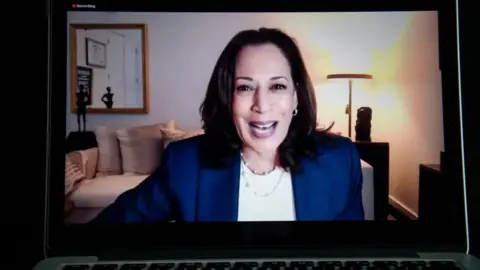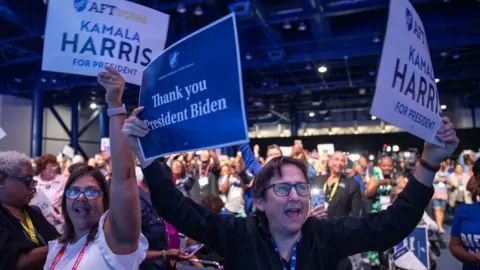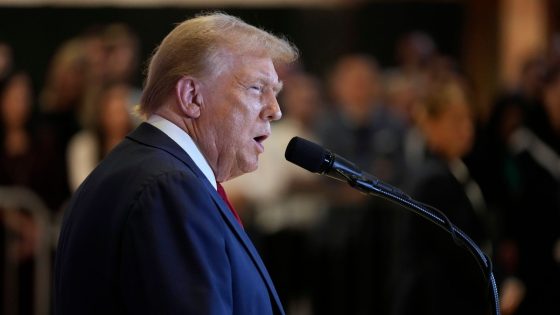 Getty Images
Getty ImagesIt began with a group of black women on a Zoom call who hit a million-dollar fundraising target in about three hours.
A series of similar Zooms have followed, targeting other groups on behalf of the Kamala Harris presidential campaign.
The latest on Monday night was a three-hour call titled “White Dudes for Harris”, which organisers say attracted 190,000 people and raised more than $4m (£3.1m) in donations.
High-profile celebrities and politicians were among those present.
The US vice-president’s bid for the top job is barely more than a week old. Still, it is harnessing a grassroots energy that did not exist for President Joe Biden, with supporters using modern video conferencing to reach motivated voters and fundraise virtually.
In the past week – roughly 100 days from Election Day – the campaign has raised $200m (£155m) and signed up more than 170,000 new volunteers.
And unlike big donors who helped persuade Mr Biden to step aside and end his run just days ago, it is hundreds of thousands of ordinary Democrats now generating “Kamalamentum”.
Call attendance began in the tens of thousands – already a feat given Zoom meetings are usually restricted to 1,000 participants. But since then, two calls have drawn more than 150,000 people. Zoom did not respond to requests for comment on this story.
Republicans have criticised some of the identity-based virtual gatherings as “racist” and “desperate” pandering to liberal voters.
But while some may cringe at such overt use of identity to campaign, the impact of these virtual events is being taken seriously.
The Zoom sessions are “a signal that there is enormous enthusiasm out there for her candidacy,” said Republican consultant and pollster Whit Ayres.
And, he said, it would be a mistake for Republicans to criticise the identity-based sessions.
“It backfires when you start attacking people because of their identity. Because everyone else who shares their identity feels like you’re attacking them.”
Meanwhile, Ms Harris’s opponent Donald Trump and his party have said Democrats are more energised by Mr Biden’s surprise departure from the race, rather than by Ms Harris herself.
On 21 July, a matter of hours after the president announced he was dropping out and endorsing his deputy, Win with Black Women – a collective of black female political organisers – convened the first Zoom call.
The four-hour conversation attracted 44,000 participants and raised $1.6m for Ms Harris. The original goal was $1m in 100 days.
“I felt like when Obama got the nomination all over again. I actually felt more excited, to be honest,” Black Voters Matter co-founder LaTosha Brown, who joined the call, told The 19th News.
“My first response was, ‘OK, he’s out; now we’ve got to fight for this sister’.”
Ms Harris, 59, would be the first black woman – and first South Asian woman – to secure a major American party’s nomination for president. The official nomination will take place at the Democratic National Convention in August.
Gatherings of South Asian women have followed, celebrating their “auntie”, and Latinas have hailed a “hermana”.
On 22 July, the day after Mr Biden’s announcement, more than 53,000 black men met on Zoom and raised $1.3m in about six hours.
Another giant video conference on Thursday, “White Women: Answer the Call”, kept crashing as more than 160,000 people hopped aboard – the largest call in the history of Zoom, according to organisers.
Shannon Watts, a high-profile advocate for gun control and the call’s lead organiser, wrote on Twitter/X that the group had raised $11m for Ms Harris.
“White women are the largest voting bloc in this country. We make up 40% of the voters and so we are divided by religious, marital and education lines,” Ms Watts told CBS News, the BBC’s US partner.
“And even a tiny shift in our voting patterns can swing an entire election, and so that was a conversation that we needed to have on this call.”
By Monday evening, “White Dudes for Harris” appeared to have broken the Zoom record set by their female counterparts.
Supporters were told, sometimes in profane terms, not to let the Trump campaign speak for “all white men”.
“I’m white, I’m a dude and I’m for Harris – a woman president, man… how exciting,” actor Jeff Bridges, who played The Dude in the 1998 hit film The Big Lebowski, told the group.
Others who delivered remarks included actors Joseph Gordon-Levitt, Mark Ruffalo, Mark Hamill and Sean Astin, as well as four of Ms Harris’s vice-presidential contenders – Gary Peters, JB Pritzker, Pete Buttigieg and Tim Walz.
 Getty Images
Getty ImagesThe Trump campaign should be concerned if Ms Harris can build on this momentum and avoid off-the-cuff gaffes during public events, Mr Ayres argues.
The Zoom sessions appear to be a helpful way for her message to reach voters in an informal setting while touching on her campaign’s stump points. It’s quite the opposite from her 2019 bid, when she was “incoherent” and spoke “gibberish” when challenged on key issues, he said.
“If she runs her campaign like she did the last time she ran for president, her campaign will collapse and Donald Trump will waltz into the White House,” Mr Ayres added.
“On the other hand, if she has learned how to be a competent national candidate under enormous pressure, she’s gonna give him a real run for his money.”
The enthusiasm for the Harris candidacy is a far cry from how July began, with wealthy Democratic donors, including Abigail Disney and George Clooney, publicly and privately voicing concerns about Mr Biden’s shaky re-election bid.
On Saturday, in the sprawling Florida retirement community of The Villages, residents in 500 golf carts rallied on behalf of Ms Harris – a remarkable event in a predominantly white and famously conservative stronghold.
Polls conducted over the past week show Ms Harris in a dead heat with Mr Trump, erasing his narrow lead or sitting within the margin of error in most cases.
With reporting from Max Matza
Source Agencies




